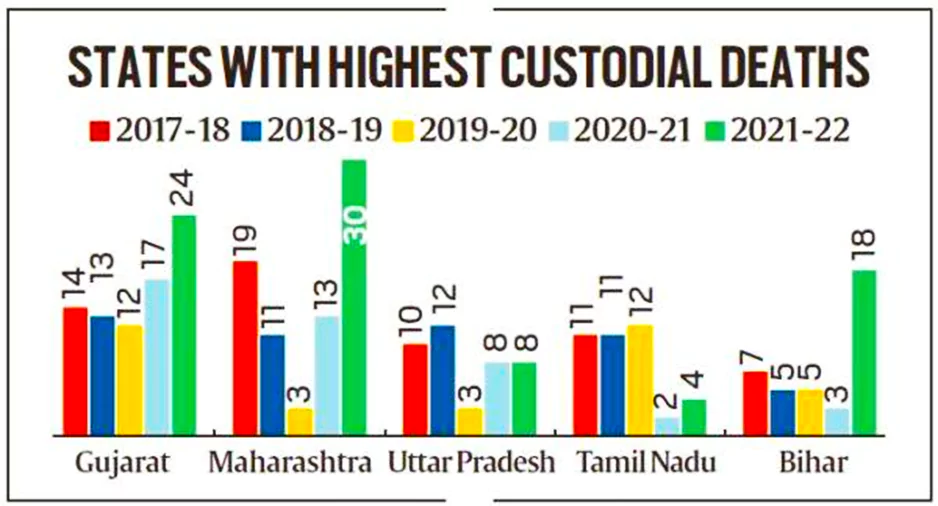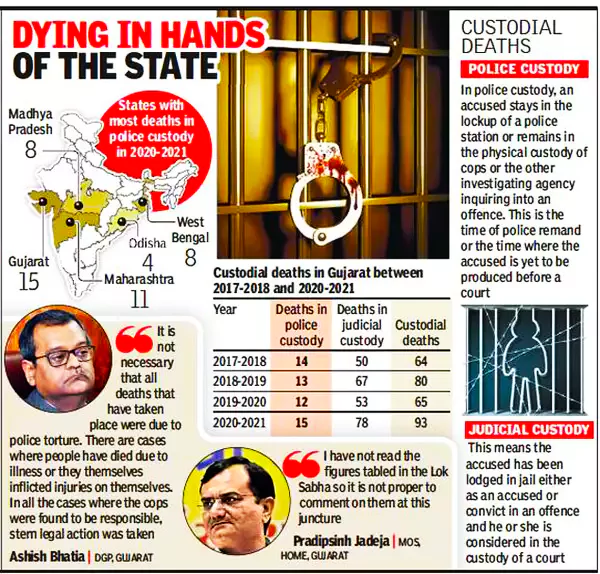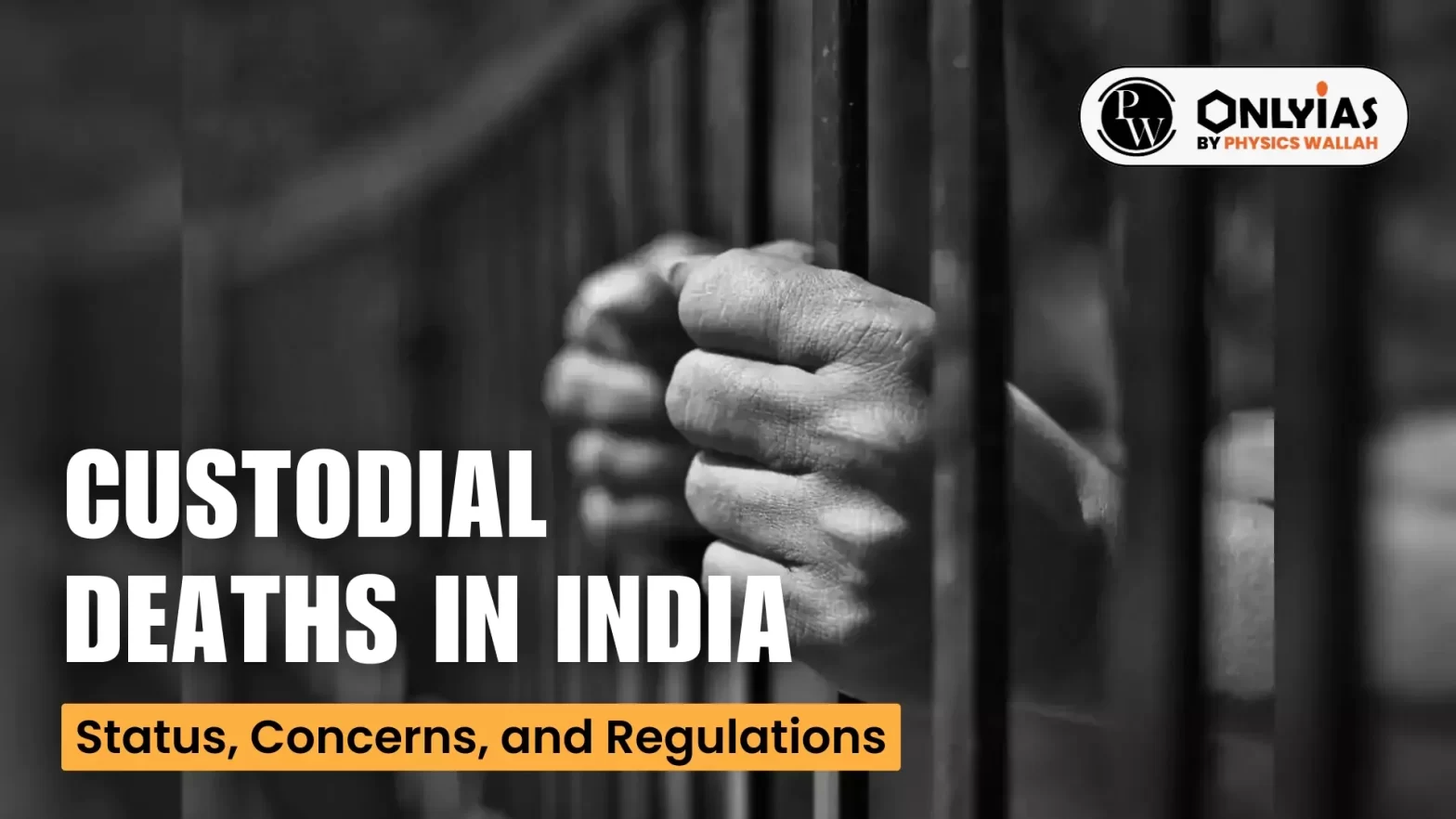Context
Recently, the Supreme Court has said there is a need to take a “stricter view” while dealing with bail pleas of police personnel accused in custodial death cases.
Custodial Deaths in India: Recent Cases and State Trends

- Recently, UP DGP reiterated guidelines to prevent custodial deaths.
- Also, in Tamil Nadu, a police inspector was suspended over ‘custodial death’.
- In February this year, a Sub-Inspector from Surat had been booked for attempted murder subjected to custodial torture.
- State has highest custodial death in India: From 2017-22, the highest number of custodial deaths have been reported in Gujarat followed by Maharashtra, Uttar Pradesh, Tamil Nadu and Bihar.
Enroll now for UPSC Online Course

Custody & Its Types
The Custody means someone assigned for the protection of care or guardianship of something.
- However, for every arrest is custody but not every custody will be held for arrest.
- Types of Custody: Following are the two type of custody the Indian judicial system has for the prisoners:
- Police Custody: In this custody, a police officer arrests the accused by following the receipt of information or complaint or report by police about crime and prevents him/her from committing further offenses and brings him to the police station.
- Here, the accused is kept in the lock-up.
- Specific Timeframe: The police officer has the time of 24 hours to interrogate the suspect and if finds that the suspect is guilty then the duty of the police is to file a charge-sheet after taking him to the Magistrate.
- Judicial Custody: In this custody, an accused is kept in jail by the order of the concerned magistrate. When an accused is presented before a magistrate, he/she can either be sent to jail or kept under police custody by the magistrate.
- When the accused is in judicial custody the police have no right of interrogation and police find that interrogation is necessary as per the facts or instances of the case.
- Custody and Judicial Remand in India: As per Section 57 of the CrPC, a police officer cannot detain a person in custody for more than 24 hours and the officer needs to seek special permission from the magistrate to hold further.
- Custodial Violence: As per the Law Commission of India, custodial violence is the crime by a public servant against the arrested or the detained person who is in custody.
|
About Custodial Death
- Definition: It is defined as a death that takes place while a person is in custody, and is either directly or indirectly related to or significantly attributable to activities that were carried out while the person was in custody.
- Coverage: It covers fatalities that take place in a jail, on a police or even other vehicle, at a private or medical facility, or in a public space.
- Occurrence: It can happen due to negligence by the concerned authorities in any form of torture or cruel, inhuman, or degrading treatment by the police officers.
- Custodial deaths can happen naturally, without any participation from the police, for example, when a criminal defendant or accused person passes away from sickness.
- Instruction by the National Human Rights Commission (NHRC): In 1993, NHRC had issued a general circular requiring all the District Magistrates and the Superintendents of Police to report to the Commission, incidents relating to custodial deaths within 24 hours of their occurrence.
Provisions Related to Custodial Deaths in India
|
Deals With
|
| Constitutional Provisions |
- Article 20: It grants protection against arbitrary and excessive punishment to an accused person, whether a citizen or foreigner or legal person like a company or a corporation. It contains three provisions in that direction:
- No ex-post-facto law: It provides that a person should be prosecuted as per those laws that were in force when he committed the offense.
- No double jeopardy: It provides that a person shall not be prosecuted and punished for the same offense more than once.
- No self-incrimination: It provides that a person accused of an offense shall not be compelled to be a witness against himself.
- In Selvi vs. State of Karnataka, it was observed that the state could not perform narco-analysis, polygraph, and brain-mapping tests on any individual without their consent.
- Article 21: It provides the citizens of India with the right to life and personal liberty. Following are certain rights available for prisoners:
- Right to Bail
- Right against Solitary Confinement
- Right against Inhuman Treatment
- Right against Illegal Detention
- Right to a Speedy and Fair Trial
- Right to meet Friends and Consult a Lawyer
- Article 22: It guarantees protection against arrest and detention in certain cases and provides that no person who is arrested shall be detained in custody without being informed of the grounds of such arrest.
-
- The Right to be presented before a magistrate within 24 hours of arrest.
- The Right not to be ill treated or tortured during arrest or in custody.
|
| Guidelines by the Supreme Court |
- In the Case of D.K. Basu vs. State of West Bengal, the Supreme Court held that the rights guaranteed under Article 21 of the Constitution could not be denied to convicts, under-trials, and other prisoners in custody, except according to the procedure established by law.
- The SC of India has laid down specific requirements and procedures:
- Right to Inform: The person arrested, detained or being interrogated has a right to inform a relative, friend or well wisher.
- When a friend or relative lives outside the district, the time, place of arrest and venue of custody must be notified by police within 8 to 12 hours after arrest.
|
| Guidelines by NHRC |
- Interrogation on Identifiable Place: The interrogation should be conducted in a clearly identifiable place, which has been notified for this purpose by the Government.
- Right to Know Place by Relatives: The place must be accessible and the relatives or friends of the person arrested must be informed of the place of interrogation taking place.
- A Humane Interrogation: The methods of interrogation must be consistent with the recognised rights to life, dignity and liberty and right against torture and degrading treatment.
|
| The Indian Penal Code (IPC), 1860 |
- Section 302: A police officer murdering an accused in custody shall be punished for the offense of murder.
- Section 304: A police officer can be punished for custodial death under ‘culpable homicide not amounting to murder’.
- The provisions of ‘causing death by negligence’ under Section 304 can also be attracted if the case falls within its ambit.
- Section 306: Once the victim has committed suicide and if it is proved that the police officer has abetted the commission of such suicide, then the police officer will be held liable for punishment under section 306.
- Section 330 & 331: If a police officer voluntarily causes hurt or grievous hurt to extort confession, then such police officer shall be punished under section 330 of IPC for voluntarily causing hurt or under Section 331 of IPC for voluntarily causing grievous hurt.
- Section 342: A police officer can also be punished for wrongful confinement.
|
| The Code of Criminal Procedure (CrPC), 1973 |
- Section 41: Arrests and detentions for interrogation have reasonable grounds and documented procedures and arrests are made transparent to family, friends, and the public, and there is protection through legal representation.
- Section 49: It provides that the police are not permitted to use more restraint than is necessary to prevent the escape of the person.
- Section 176: It requires the Magistrate to hold an inquiry into the cause of death whenever a person dies in custody of the police.
- There are some provisions like Section 53, 54, 57, and 167 which are aimed at providing procedural safeguards to a person arrested by the police.
|
| Indian Police Act, 1861 |
- Section 7 and 29 empower senior police officers to dismiss or suspend negligent police officers and penalises police personnel for carrying out their duty negligently.
|
International Conventions Against Custodial Torture:
- International Human Rights Law, 1948
- United Nations Charter, 1945
- The Nelson Mandela Rules, 2015
- United Nations Convention Against Torture, 1984
International Laws associated with Human Rights:
- Universal Declaration of Human Rights, 1948
- International Covenant on Civil and Political Rights, 1966
- United Nations Standard Minimum Rules for the Treatment of Prisoners, 2015
- United Nations Charter, 1945
- European Convention for the Protection of Human Rights and Fundamental Freedoms, 1950
|
Enroll now for UPSC Online Classes
Concerns Associated with Custodial Deaths
- Violation of Fundamental Laws: Custodial death due to torture and violence by police is against the fundamental structure and values of the Indian Constitution.
- It is a violation of articles 20, 21 and 22 of the Indian Constitution.
- Against Moral Values: Sometimes, the police authority abuses the convicted even before the formal arrest, claiming injuries occurred prior to custody.
- Recently, the Punjab and Haryana high court has held that custodial deaths represent a reprehensible abuse of power given the vulnerability of detainees and the unequal power dynamics.
- Severe Offenses Committed by Police Misusing the Custody: Sometimes, police misused the Custody and causing torture to the victims.
- Rape: Rape is one of the prevalent forms of custodial torture.
- The Mathura Rape Case: An incident of custodial rape in Gadchiroli district of Maharashtra in 1972, wherein a tribal girl named Mathura was allegedly raped by two policemen in the Police Station.
- Harassment: It is prevalent among the police and leads to many sufferings to the victims.
- Nilabati Behera vs. the State of Orissa: In this case, the victim had died due to the harassment and beatings by the police.
- Illegal Detention: Depriving an individual of their personal liberty without following the process of law amounts to illegal detention. It includes unlawful imprisonment, continuous restraint of a person at a place or restraining a person from reaching a place. It is a violation of Article 21 of the Constitution and leads to immense pain and suffering.
- Rudal Shah vs. the State of Bihar: In this case, the accused was kept in jail for 14 years, after his acquittal by the Sessions Court.
- Fake Encounters: It is a type of custodial death, and has recently been used in the headlines.
- Pradeep Sharma, a former Mumbai Police ‘encounter specialist,’ has been sentenced to life imprisonment by the Bombay High Court for his involvement in the fake encounter in 2006.
- This landmark judgment marks the first conviction of police officers in a fake encounter case in India.
Way Forward To Prevent Custodial Deaths in India
- Adopt Strict Approach: To prevent custodial deaths, implementation of guidelines and directives recommended in Prakash singh case is required.
- Directives laid down in Prakash Singh vs. Union of India, 2006:
- Establishment of a Police Establishment Board
- Formation of the National Security Commission
- Formation of a State Security Commission
- Formation of a Police Complaint Authority
- Separation of the investigation and law and order functions of the police
- Merit-based system for the appointment of the Director-General of the Police
- Two-year minimum tenure for SP and station house officers
- Compensation to the victim
- Time for Reforms in Police Attitude: There is a need to enhance police training programs to emphasise respect for human rights and dignity.
- There is an urgent need to change the rude police attitude and promote a culture of accountability, professionalism, and empathy within law enforcement agencies.
- More Monitoring & Enquiry: With rising high cases of custodial deaths in India, time has come to encourage civil society organisations to actively advocate for victims of custodial torture.
- The National Human Rights Commission (NHRC) should be allowed to inquire into any matter even after one year from the date of the alleged human rights violation and also the jurisdiction should be expanded on human rights violations by armed forces with appropriate measures.
- Assistance to Victim & its Family: To maintain the soul of justice, there is a need to provide more legal support to victims and their families.
About UNCAT:
- United Nations Convention Against Torture (UNCAT): It is an international human rights treaty, under the review of the UN and was adopted in 1984.
- It aims to prevent torture and other acts of cruel, inhuman, or degrading treatment or punishment around the world.
|
-
- In Nilabati Behera vs. the State of Orissa, the court held that when the state violates the constitutional right to life of a citizen, it has an obligation to provide compensation.
- Learn from Other Countries’ Best Practices: The Torture and Custodial Death (Prevention) Act, 2013 is an Act passed by the Jatiya Sangsad in 2013 to prohibit torture in custody in Bangladesh.
- The Prevention of Torture Bill, 2017 was one of the primary legislation that was enacted as law of parliament in relation to custodial torture in the country. Now, time has come to take strict actions regarding the bill.
- Time for Collaboration: Collaborating with international human rights bodies and organisations is required to seek redress and justice. The Government of India signed the UN Torture Convention in October 1997 but is yet to ratify it.
Enroll now for UPSC Online Course
Also Read: Need For Reforming Bail Laws In India: Supreme Court
| Prelims PYQ (2023):
In essence, what does ‘Due Process of Law’ mean?
(a) The principle of natural justice
(b) The procedure established by law
(c) Fair application of law
(d) Equality before law
Ans: (a) |
![]() 17 Apr 2024
17 Apr 2024


